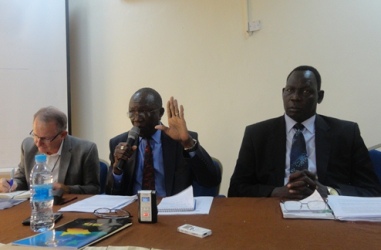S. Sudan: Abolition of death penalty is a “gradual” approach
September 23, 2012 (JUBA) – The Chairperson of South Sudan Human Rights Commission (SSHRC) on Friday warned against recent calls for abolishment of the death penalty in the country, saying the process could invite problems, if not handled through a gradual approach.

“If the death penalty is to be abolished in South Sudan, the whole assembly [National Assembly] will meet and discuss the whole issues of the death penalty and others, before making a decision,” Korbandy said.
“I tell you those who were killed in Yei [Central Equatoria], Yambio [Western Equatoria], Rumbek [Lakes] and Jonglei have relatives just like me and you. They will do the same issue of revenge and we don’t want to see this happening in this country,” he added.
Korbandy’s remarks will likely spark a new chapter to the on-going debate on whether South Sudan should abolish the death penalty or not, following last month’s execution of two prisoners in a central prison in Juba, the country’s capital.
Amnesty International, on Friday, said it remains opposed to the death penalty in South Sudan, describing it as a “violation of the right to life and as the ultimate cruel, inhumane and degrading punishment.”
By executing the two prisoners, Amnesty International said South Sudan contravened global standards, including the 1984 UN Safeguards Guaranteeing Protection of the Rights of Those Facing the Death Penalty and UN Commission on Human Rights resolution 2005/59.
“South Sudan’s use of the death penalty contravenes these standards. Weaknesses in the country’s criminal justice system, primarily the non-observance of fair trial standards, such as the lack of provision for legal representation for all accused persons emphasize the need to abolish the death penalty without delay,” partly reads Amnesty’s 21 September statement.
The United Nations, last month, issued a similar statement criticizing South Sudan’s execution of the two inmates and called for abolition of the death penalty. The campaign has since gained momentum, with South Sudan Law Society, Comboni missionaries and domestic human rights groups joining the fray.
The SSHRC chairperson also expressed concerns about constant criticism by the international community of South Sudan’s judicial system, which he said comprises competent judges and courts capable of handling all cases in the country.
He however urged human right defenders at the workshop, which was organized by East and Horn of Africa Human Rights Defenders Project (EHAHRDP), to raise awareness on the death penalty issues among society members.
(ST)
